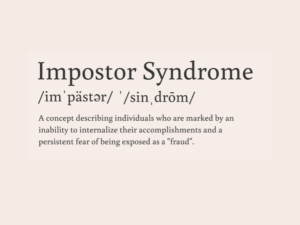In the Past Year I Learned a New Phrase
 I’ve been a full time, professional voice over actor for quite a while now, but in the past year I started hearing for the first time a new term: imposter syndrome. I started hearing it on social media, on Clubhouse, and at conferences too. I found it surprising because in all my years in VO, I had never heard any other talents speak to this before. What I have learned is that this term refers to the feeling that one does not actually belong, or is not what they claim to be and is, instead, an imposter. Suddenly, in the past year, I am hearing about others feeling this way frequently. It is coming up often in conversation. Perhaps it is because many turned to voice over during covid. Perhaps it is because some start working or trying to work before they are actually prepared. For a multitude of reasons, suddenly I am hearing this all over the place. If you are interested in being a voice over actor, and you really want to succeed and do NOT want to feel like an imposter, perhaps consider my experience, as this has never been an issue for me.
I’ve been a full time, professional voice over actor for quite a while now, but in the past year I started hearing for the first time a new term: imposter syndrome. I started hearing it on social media, on Clubhouse, and at conferences too. I found it surprising because in all my years in VO, I had never heard any other talents speak to this before. What I have learned is that this term refers to the feeling that one does not actually belong, or is not what they claim to be and is, instead, an imposter. Suddenly, in the past year, I am hearing about others feeling this way frequently. It is coming up often in conversation. Perhaps it is because many turned to voice over during covid. Perhaps it is because some start working or trying to work before they are actually prepared. For a multitude of reasons, suddenly I am hearing this all over the place. If you are interested in being a voice over actor, and you really want to succeed and do NOT want to feel like an imposter, perhaps consider my experience, as this has never been an issue for me.
Lots of Training
When I started working in voice over, really working, it was after no less than a year of working at getting into voiceover. In that  year, I worked with 4 coaches and took advanced acting and improv at a local theater. I spent sic to eight hours A DAY studying and working on my craft. I worked on scripts. I practiced characters. I recorded. I edited. I submitted to my coaches. I listened back to my assignments. I did research and followed prominent voice actors to see what they were booking. I took multiple private lessons each week. I was in group classes with GVAA. I had practice partners. I met with those partners. I did homework for those partners too and I took each and every assignment so seriously, as if my life depended on it. So when I say I had lots of training, that is just when I started out. Since then I have continued to have lots of coaching. Have coaching is the foundation of all we do. I think by the time my website launched, I was so ready to work that it never occurred to me that I was not prepared to serve my clients.
year, I worked with 4 coaches and took advanced acting and improv at a local theater. I spent sic to eight hours A DAY studying and working on my craft. I worked on scripts. I practiced characters. I recorded. I edited. I submitted to my coaches. I listened back to my assignments. I did research and followed prominent voice actors to see what they were booking. I took multiple private lessons each week. I was in group classes with GVAA. I had practice partners. I met with those partners. I did homework for those partners too and I took each and every assignment so seriously, as if my life depended on it. So when I say I had lots of training, that is just when I started out. Since then I have continued to have lots of coaching. Have coaching is the foundation of all we do. I think by the time my website launched, I was so ready to work that it never occurred to me that I was not prepared to serve my clients.
Long Days
 Both as a student of voice over and now as a professional, I have always put in extremely long days. From morning to night, often going back into my booth after dinner, my days are long and rigorous. Sometimes new talents ask me when they will start booking. They tell me they have submitted 50 auditions. I try to keep a straight face. I typically submit more than 30 auditions in a day, even now, so 50 auditions is in no way impressive to me. I have often heard of the rule of 10. I believe that Gaby Nistico has even made a video about it. If you work 10 hours a day more than 10 months a year for 10 years that is when you start making six figures… Well, I believe there is something to this. I have always had the luxury of being in voice over “full-time.” Well, let’s flesh this out. What exactly does “full-time mean? To me, it means I maintain standard business hours and I am in my booth al day every day to serve my clients. The more you are available and the more you record and submit, the more legitimate your business is.
Both as a student of voice over and now as a professional, I have always put in extremely long days. From morning to night, often going back into my booth after dinner, my days are long and rigorous. Sometimes new talents ask me when they will start booking. They tell me they have submitted 50 auditions. I try to keep a straight face. I typically submit more than 30 auditions in a day, even now, so 50 auditions is in no way impressive to me. I have often heard of the rule of 10. I believe that Gaby Nistico has even made a video about it. If you work 10 hours a day more than 10 months a year for 10 years that is when you start making six figures… Well, I believe there is something to this. I have always had the luxury of being in voice over “full-time.” Well, let’s flesh this out. What exactly does “full-time mean? To me, it means I maintain standard business hours and I am in my booth al day every day to serve my clients. The more you are available and the more you record and submit, the more legitimate your business is.
Sure of My Identity
 When my business launched, in audition to lots of coaching and sweat equity under my belt, my first website helped establish my identity. I never had doubts about my identity as a professional. I had been told by every coach I ever worked with that even at the start of my career, I should introduce myself as a professional. I did so with confidence. As I get clients under my belt and had testimonials, I felt more proud of what I was building, but it never came from a place of doubt. I was certain that I was building a great service business that would help my clients get what they need.
When my business launched, in audition to lots of coaching and sweat equity under my belt, my first website helped establish my identity. I never had doubts about my identity as a professional. I had been told by every coach I ever worked with that even at the start of my career, I should introduce myself as a professional. I did so with confidence. As I get clients under my belt and had testimonials, I felt more proud of what I was building, but it never came from a place of doubt. I was certain that I was building a great service business that would help my clients get what they need.
Wholly Committed
Another reason I think I never suffered from this imposter syndrome is that I was entirely committed from day 1. Basically, I bet the house on it. I built a high-end studio. I had an expensive microphone. I was working full time. It was never an option for it to not work. Success was my only possible outcome. It never occurred to me that I was not a voice actor. I set out to live this life and I did. Period. Sometimes we have choices in this world, but as a working mom, failure was not an outcome I was willing to explore. I only had one potential outcome for myself and my children, and that was for the business to take off.
 So if you asked me when I got into voice over what I dreamt of doing, I would have told you that “I want to be a Disney princess,”or “I hope to book a target commercial.” Never did I utter the words, “I want to do radio imaging.” Why? Because I had no idea that this genre of voice over even existed, or what it meant to be a female radio imaging voice for a station. I actually attended a GVAA webinar that J. Michael Collins did on radio imaging and a light bulb went off in my head. All of this energy, enthusiasm, and passion that I was constantly having to tone down for my conversational commercial voice over reads was what made me perfect for radio imaging! That enthusiasm was the essential ingredient for station liners, stingers, promos… anything necessary in imaging!
So if you asked me when I got into voice over what I dreamt of doing, I would have told you that “I want to be a Disney princess,”or “I hope to book a target commercial.” Never did I utter the words, “I want to do radio imaging.” Why? Because I had no idea that this genre of voice over even existed, or what it meant to be a female radio imaging voice for a station. I actually attended a GVAA webinar that J. Michael Collins did on radio imaging and a light bulb went off in my head. All of this energy, enthusiasm, and passion that I was constantly having to tone down for my conversational commercial voice over reads was what made me perfect for radio imaging! That enthusiasm was the essential ingredient for station liners, stingers, promos… anything necessary in imaging!  The team at OneVoice put together an all-star panel for Radio Imaging. I am elated to be on stage with these folks. In addition to me, the others include Randy Thomas, Joe Cipriano, AJ McKay, Paul Cartwright, and Brent Williams. I have to say, to be up there with Randy blows my mind a little. When J. Michael and AJ did my first multi-format imaging demo back in 2017, and I asked how to get started in radio imaging, JMC connected me with Randy. She suggested that I fly out to LA for her VO Mastery conference, which turned out to be amazing. Since then, she has been a mentor to me. While there, I took a master class with Joe Cipriano in promos. It was incredible. I had been a working pro for quite some time at that point, but was new to radio imaging. To be on a stage with them means so much. If you don’t know, in addition to voicing countless radio stations around the country, Randy has announced the Oscars, the Super Bowl, and the Tonys! Joe Cipriano is a man who typically needs no introduction, but just in case you’ve been locked in a broom closet, he has been the voice of Fox and CBS for over 25 years.
The team at OneVoice put together an all-star panel for Radio Imaging. I am elated to be on stage with these folks. In addition to me, the others include Randy Thomas, Joe Cipriano, AJ McKay, Paul Cartwright, and Brent Williams. I have to say, to be up there with Randy blows my mind a little. When J. Michael and AJ did my first multi-format imaging demo back in 2017, and I asked how to get started in radio imaging, JMC connected me with Randy. She suggested that I fly out to LA for her VO Mastery conference, which turned out to be amazing. Since then, she has been a mentor to me. While there, I took a master class with Joe Cipriano in promos. It was incredible. I had been a working pro for quite some time at that point, but was new to radio imaging. To be on a stage with them means so much. If you don’t know, in addition to voicing countless radio stations around the country, Randy has announced the Oscars, the Super Bowl, and the Tonys! Joe Cipriano is a man who typically needs no introduction, but just in case you’ve been locked in a broom closet, he has been the voice of Fox and CBS for over 25 years. When I first looked at this line up, I was ecstatic, then I got nervous. Then I realized the very reason I was nervous is why I need to be on the panel. You see, unlike people like Randy and AJ, I did not work into radio imaging because of a background in radio or work as a DJ. I know lots of brilliant talents… Issa Lopez, Chad Ericson, Josh Goodman, Jeff Berlin… who all started as DJs and got into imaging. I am different. I came to voice over in my mid-thirties. I have always booked a lot of commercials. I love doing commercials. I have a ton of energy, and I needed to find what else was in that category. I love working with my radio stations for imaging. From CHR, to Christian, to Oldies to Adult Hits, I am happy in many formats. But you can’t just record a demo and hope that the universe sends you work. Having work in imaging requires consistent, daily follow up. It takes commitment and hard work. It takes determination. Talent and the ability to voice the liners is only a small part of booking imaging work, especially for those of us not from Radio. So I am on this panel to talk about how a determined, hardworking, focused, ambitious voice actor built a solid radio imaging business all on her own.
When I first looked at this line up, I was ecstatic, then I got nervous. Then I realized the very reason I was nervous is why I need to be on the panel. You see, unlike people like Randy and AJ, I did not work into radio imaging because of a background in radio or work as a DJ. I know lots of brilliant talents… Issa Lopez, Chad Ericson, Josh Goodman, Jeff Berlin… who all started as DJs and got into imaging. I am different. I came to voice over in my mid-thirties. I have always booked a lot of commercials. I love doing commercials. I have a ton of energy, and I needed to find what else was in that category. I love working with my radio stations for imaging. From CHR, to Christian, to Oldies to Adult Hits, I am happy in many formats. But you can’t just record a demo and hope that the universe sends you work. Having work in imaging requires consistent, daily follow up. It takes commitment and hard work. It takes determination. Talent and the ability to voice the liners is only a small part of booking imaging work, especially for those of us not from Radio. So I am on this panel to talk about how a determined, hardworking, focused, ambitious voice actor built a solid radio imaging business all on her own. If you’re in voice over, and you’re on Facebook, then you know how many groups there are for voice actors. There are so many. Why do I think voice actors spend time posting, commenting, and chatting on Facebook? Well, when you work alone in a padded foam booth, it’s really nice to have people. There is a really amazing, close knit voiceover industry, and even during covid, we all stayed close by continuing to chat on places like Facebook. In the past two weeks, I had to Facebook anniversary reminders of
If you’re in voice over, and you’re on Facebook, then you know how many groups there are for voice actors. There are so many. Why do I think voice actors spend time posting, commenting, and chatting on Facebook? Well, when you work alone in a padded foam booth, it’s really nice to have people. There is a really amazing, close knit voiceover industry, and even during covid, we all stayed close by continuing to chat on places like Facebook. In the past two weeks, I had to Facebook anniversary reminders of  friendiversaries with close friends. Seeing these video reels flash in my feed brought me profound joy. It reminded me of how much I have built. If you have the privilege of working in voiceover, and you are successful, you know that it takes a lot more that years of long days of hard work. Success in voice over also takes the support of awesome industry friends who are there to support you on good days and bad.
friendiversaries with close friends. Seeing these video reels flash in my feed brought me profound joy. It reminded me of how much I have built. If you have the privilege of working in voiceover, and you are successful, you know that it takes a lot more that years of long days of hard work. Success in voice over also takes the support of awesome industry friends who are there to support you on good days and bad. If I had to go back to the very beginning, and try to unravel this thread, I’m not really sure how my multitude of VO friendships and connections started. It may have begun with Anne Ganguzza and VO Peeps. I certainly “met” other voice talents that way. It may have begun with taking zoom classes through GVAA and keeping in touch with my classmates. It may also have begun with attending Uncle Roy’s famous BBQ. As a newbie, all of these made me feel part of a community and helped me see where I fit in. When you are just starting out, it is sometimes hard to push yourself to go. You might worry that no one will talk to you. It is so, so important to go and meet people face to face.
If I had to go back to the very beginning, and try to unravel this thread, I’m not really sure how my multitude of VO friendships and connections started. It may have begun with Anne Ganguzza and VO Peeps. I certainly “met” other voice talents that way. It may have begun with taking zoom classes through GVAA and keeping in touch with my classmates. It may also have begun with attending Uncle Roy’s famous BBQ. As a newbie, all of these made me feel part of a community and helped me see where I fit in. When you are just starting out, it is sometimes hard to push yourself to go. You might worry that no one will talk to you. It is so, so important to go and meet people face to face. Conferences are an AMAZING place to bond. It literally does not matter which conference you pick, they are incredible. Yes, there is lots of learning and sharing of knowledge. But, in truth, as we all learned from doing everything remotely this year, the educational aspect alone is not what gets us to leave our families and hope on a plane. It is for sure the social aspect of the conferences that is worth more than gold. It feeds your soul and builds you up. The interactions are genuine and you will make friendships that endure. The women that I speak to daily I “knew” before I met them in person, but seeing them at WoVo Con and seeing them at VO Atlanta was our time to connect and really get to know each other. We lift each other up in every way possible.
Conferences are an AMAZING place to bond. It literally does not matter which conference you pick, they are incredible. Yes, there is lots of learning and sharing of knowledge. But, in truth, as we all learned from doing everything remotely this year, the educational aspect alone is not what gets us to leave our families and hope on a plane. It is for sure the social aspect of the conferences that is worth more than gold. It feeds your soul and builds you up. The interactions are genuine and you will make friendships that endure. The women that I speak to daily I “knew” before I met them in person, but seeing them at WoVo Con and seeing them at VO Atlanta was our time to connect and really get to know each other. We lift each other up in every way possible. week I co-host a panel with one of my VO besties and fellow VO Coach Diana Birdsall. Our club is called “Ask the VO Coaches” and recent panelists have including Dave Scott from All Systems Go AV, Randy Thomas, George-the-Tech Whittam, Dan Leonard, Shelley Avellino, Bev Standing and more! Lot’s of voice actors come into the room and we chat about topics that matter to us. Clubhouse has given us a space to support each other and have an active and on going dialogue that raises the level of performance of the industry.
week I co-host a panel with one of my VO besties and fellow VO Coach Diana Birdsall. Our club is called “Ask the VO Coaches” and recent panelists have including Dave Scott from All Systems Go AV, Randy Thomas, George-the-Tech Whittam, Dan Leonard, Shelley Avellino, Bev Standing and more! Lot’s of voice actors come into the room and we chat about topics that matter to us. Clubhouse has given us a space to support each other and have an active and on going dialogue that raises the level of performance of the industry.  Let me share two experiences that happened in the past week. Last week, I heard from an Indie Video Game producer that I worked with in 2016. They were offering me the same role I played then. I had detailed notes in my CRM that they needed a discount as they were trying to launch the game with a kickstarter campaign. When I quoted them this time a normal, mid-range rate, they came back to me saying they were shocked that my rated had gone up. They went on to say that the five other talents had agreed to the rate they offered and they wanted to pay everyone the same. I referred them to the GVAA rate guide, which I will discuss later, and reminded them of the terms of 2016. They came up to my rate for me and for the other talents.
Let me share two experiences that happened in the past week. Last week, I heard from an Indie Video Game producer that I worked with in 2016. They were offering me the same role I played then. I had detailed notes in my CRM that they needed a discount as they were trying to launch the game with a kickstarter campaign. When I quoted them this time a normal, mid-range rate, they came back to me saying they were shocked that my rated had gone up. They went on to say that the five other talents had agreed to the rate they offered and they wanted to pay everyone the same. I referred them to the GVAA rate guide, which I will discuss later, and reminded them of the terms of 2016. They came up to my rate for me and for the other talents. Imagine a scenario where we all just stopped negotiating. Let’s say a client offers $200 for two TV commercials with no mention of the length of usage, and instead of trying to negotiate, sort out the details, and explain why buy outs don’t work for us, we all just said “sure.” The implications would be staggering. The clients, then, would assume there is nothing wrong with this sweat shop pay, and would assume that our years of coaching and on-going professional development, that our expensive studio equipment, that the service we provide, that none of it has value, and that the can continue to lower and lower the rates. Where will it end? How low will they go? I shudder at the thought, and fear that if we are not willing to walk away, these bargain basement rates will become more and more common. You must know your worth and be willing to stand up for it.
Imagine a scenario where we all just stopped negotiating. Let’s say a client offers $200 for two TV commercials with no mention of the length of usage, and instead of trying to negotiate, sort out the details, and explain why buy outs don’t work for us, we all just said “sure.” The implications would be staggering. The clients, then, would assume there is nothing wrong with this sweat shop pay, and would assume that our years of coaching and on-going professional development, that our expensive studio equipment, that the service we provide, that none of it has value, and that the can continue to lower and lower the rates. Where will it end? How low will they go? I shudder at the thought, and fear that if we are not willing to walk away, these bargain basement rates will become more and more common. You must know your worth and be willing to stand up for it.


